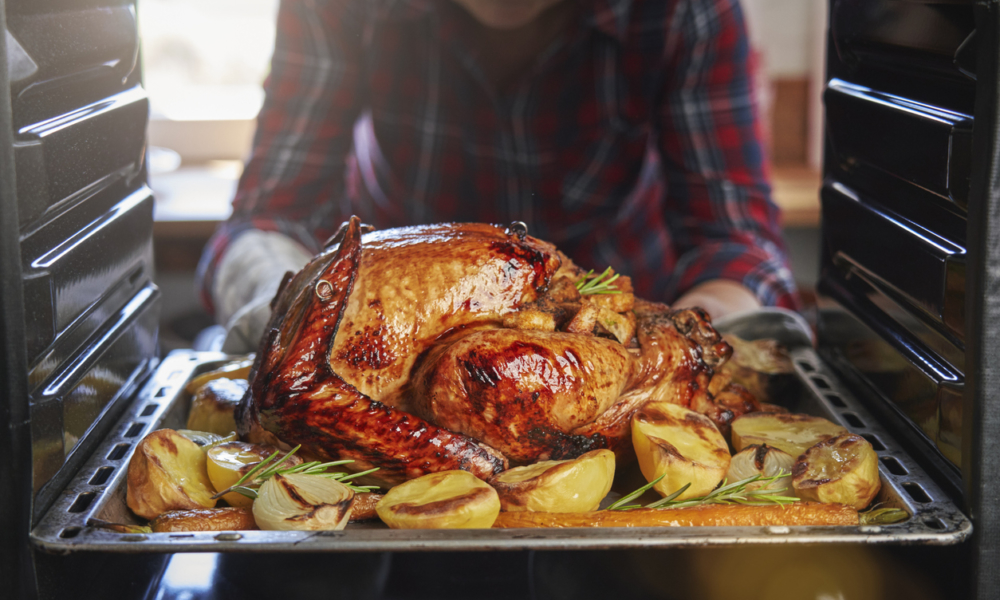
Hold the GERD, Enjoy Turkey
A digestive disorder known as gastroesophageal reflux disease (GERD) is where your lower esophageal sphincter muscle (LES, between your esophagus and stomach) doesn't function well. It allows food and stomach acids to reflux or flow back into your esophagus, which can cause burning discomfort.
If you experience heartburn a couple times (or more) a week, you may have GERD. Roughly 60 million Americans suffer heartburn at least once a month, and as many as 15 million people experience it daily. Without treatment, GERD can cause worse symptoms and even lead to esophageal cancer.
GERD Triggers
You might think that avoiding spicy, fatty, or rich foods will prevent acid reflux. However, the truth is more nuanced.
Everyone experiences GERD differently. Some people can tolerate spicy food but not chocolate, while others can drink coffee with no problem but have issues with solid foods.
In addition to spicy foods and tomato products, overeating and lying down too soon can cause heartburn. The most critical things with GERD are the amount of food you eat and the relationship with sleeping. Once the stomach has emptied, you don't have a risk of having reflux from the stomach. But until then, whatever is in your stomach will likely come back up into your esophagus (the tube connecting mouth and stomach).
Thanksgiving and GERD
Thanksgiving can be a trying holiday for people with GERD because GERD is increased by stomach pressure. The more pressure we have in our stomach, the more acid reflux is likely to occur. As you know, large meals increase abdominal pressure.
The holiday season is a tough time for many people. With all the added stress of family gatherings and travel, you may be more prone to an attack. Stress increases the excitability of nerves in your esophagus, which usually wouldn't cause any symptoms, but it can lead to severe chest pain and burning under these conditions.
Celebrating the holidays with alcohol is common, but it can cause indigestion. Alcohol relaxes the lower esophageal sphincter, which makes reflux worse, especially when combined with a large meal.
People with GERD can take medication to reduce stomach acid production, but others manage the condition by making lifestyle changes like identifying and avoiding trigger foods. On Thanksgiving, though, many people let loose and forego their usual care - which often leads to a bout of GERD.
Tips To Enjoy the Holiday and What Comes After
For a GERD or heartburn-free Thanksgiving, follow these tips:
- One serving is usually enough. Although it can be hard to say no to more food, it's crucial not to overindulge.
- Be safe with alcohol. Not only can it affect your LES, but drinking can also make you more likely to overeat. So be careful with that second helping of stuffing.
- Picking your food items wisely is crucial. Foods that are fried or extremely fatty have a higher chance of aggravating reflux, so it's best to stay away from them. Also, if you know what foods bother you specifically, do whatever is necessary to steer clear of those items.
- If you've been unsuccessfully managing your GERD with lifestyle changes, taking an over-the-counter medication 30-60 minutes before each meal might be in your best interest. For example, Prilosec can help reduce the amount of stomach acid being produced during digestion.
Even if you're careful, you may feel pain after Thanksgiving dinner. Here are some tips to avoid that:
- Bring along antacid medication like Tums in case you need it later. If you don't want to take medicine beforehand, having some antacids can help.
- Avoid the urge to lie down. Because Thanksgiving meals are so much larger than regular dinners, you should wait longer than usual before lying down. Aim for 4 hours instead of 3. If you must lie down sooner than that, use a wedge pillow to elevate your upper body and avoid indigestion or heartburn problems later on.
- Belly breathing can help.
- Start moving. Some easy movement may help your symptoms go away.
- Keep your expectations in check. People with GERD or chronic heartburn often know when they're crossing the line.
Needham Gastroenterology Associates Can Help
Needham Gastroenterology Associate encourages you to contact us and set up an appointment for screening, diagnosis, and treatment. We can help you with your gut through the holidays, don’t let your stomach ruin time with family.